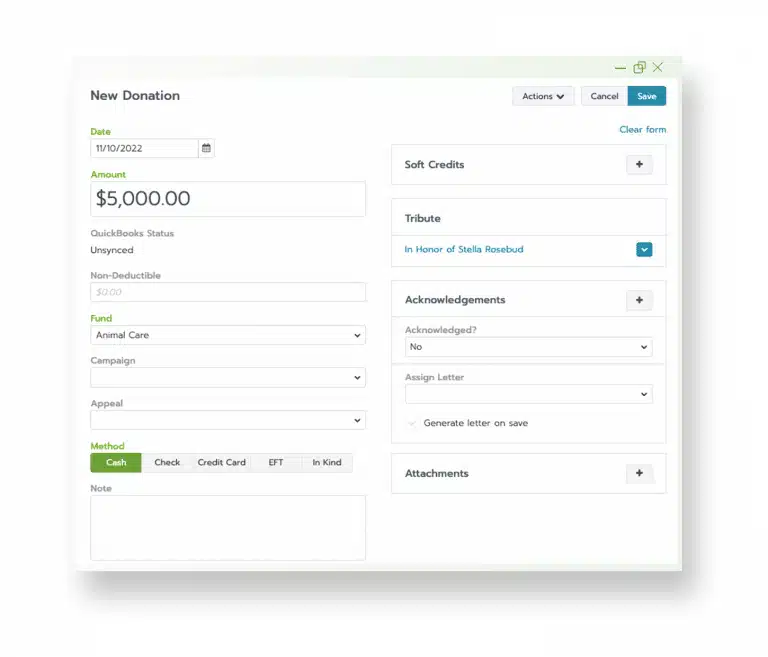

After someone passes away, their family members and friends might be motivated to donate to a nonprofit organization in their honor. Memorial donations are a beautiful way to honor someone’s life and carry on a positive legacy.
As a nonprofit, it’s your responsibility to properly manage these donations, just as you manage any other type of donation. But memorial donations require special care and attention. Specifically, your organization must properly notify families when you’ve receive donations in honor of their loved ones.
Sending family notifications for memorial donations helps build positive relationships with families and strengthen your memorial giving program. In this guide, we’ll review best practices for sending these memorial notification letters. Here’s what we’ll cover:
Keeping families in the loop is essential to respectful memorial donation management. Let’s start by taking a closer look at what a memorial donation acknowledgement letter is.
A memorial donation acknowledgement or notification letter is a message that your nonprofit sends to the family of someone who has passed away to acknowledge that your organization has received donations in memory of the individual.
Your organization might receive these gifts because the person who passed away had a special connection to your cause. Another reason you could receive these donations is that the reason the person died is related to your nonprofit’s mission. For example, if your organization raises funding for Alzheimer’s research, people might be motivated to donate because their loved one passed from Alzheimer’s.
Memorial donation notification letters improve your supporter stewardship efforts by keeping families informed about the impact of memorial gifts. Here are a few reasons why your nonprofit should send memorial donation notifications:
Memorial donation letters are slightly different from other types of donation acknowledgements, so let’s explore a few best practices for writing them.
Keep these tips in mind when drafting your memorial gift notification messages to families:

In your letters, you can also let families know that you’ll send occasional updates if your organization continues receiving in-memory gifts. Lastly, be sure to include the contact information for a representative from your nonprofit who can answer any questions families may have. This provides an easy way for families to stay in touch with your organization.
While you should personalize memorial donation notifications using your donor management software, you can still start by using a template to simplify the letter-writing process.
Sample #1:
Dear [family member name(s)],
We would like to offer heartfelt condolences on the loss of [name of the deceased]. Their unwavering commitment to [your cause] will live on through donations made in their honor.
[Your nonprofit’s name] has received gifts from the following individuals in memory of [name of the deceased]:
[donor name] [contact information]
[donor name] [contact information]
[donor name] [contact information]
These gifts honor [name of the deceased]’s incredible legacy and will allow our organization to better [describe the impact of donations on your mission].
We have sent personalized thank you messages to each donor from our organization. Should you wish to reach out to each donor and personally thank them for their contribution, you can use their provided contact information.
If you have any questions, please feel free to reach out to our memorial donations coordinator, [donation manager name]. You can reach them at [email address] or [phone number].
Sample #2:
To the [last name] family,
On behalf of [your nonprofit’s name], please accept our deepest condolences for the loss of [name of the deceased]. We are so honored that your family has chosen [your nonprofit’s name] to receive gifts made in their honor. These donations will help others facing [the issue your nonprofit helps fight] and are a beautiful way to memorialize [name of the deceased]’s life.
[Your nonprofit’s name] has received gifts from the following individuals in memory of [name of the deceased]:
[donor name] [contact information]
[donor name] [contact information]
[donor name] [contact information]
Our organization has already sent personalized thank you messages to each donor, but if you’d like to reach out to each donor and personally thank them for their contribution, you can use their provided contact information.
Please don’t hesitate to reach out to our memorial donations coordinator, [donation manager name], if you have any questions. You can reach them at [email address] or [phone number].
These templates are effective for a few reasons:
You can customize these templates to your nonprofit’s needs, adding information about your mission and your nonprofit’s brand elements.
In-memory fundraisers are growing faster than any other type of peer-to-peer fundraising. That means your nonprofit must create a dedicated strategy for managing and acknowledging memorial donations.
With robust donor management software and a clear template, your organization can quickly generate thoughtful memorial donation notifications that keep families informed throughout the process.
For more information about donation management best practices, start with these resources: